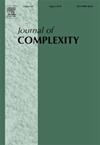从随机函数信息中优化恢复线性算子
IF 1.8
2区 数学
Q1 MATHEMATICS
引用次数: 0
摘要
本文涉及从带有随机误差的函数信息中恢复定义在函数集合上的线性算子的问题。一般来说,所构建的最优复原方法并不能利用所有可用信息。因此,利用随机误差给出的函数傅里叶变换信息,可以获得从索博廖夫类中恢复函数导数的最优方法。对于热方程的解,也考虑了类似的问题。本文章由计算机程序翻译,如有差异,请以英文原文为准。
Optimal recovery of linear operators from information of random functions
The paper concerns problems of the recovery of linear operators defined on sets of functions from information of these functions given with stochastic errors. The constructed optimal recovery methods, in general, do not use all the available information. As a consequence, optimal methods are obtained for recovering derivatives of functions from Sobolev classes by the information of their Fourier transforms given with stochastic errors. A similar problem is considered for solutions of the heat equation.
求助全文
通过发布文献求助,成功后即可免费获取论文全文。
去求助
来源期刊

Journal of Complexity
工程技术-计算机:理论方法
CiteScore
3.10
自引率
17.60%
发文量
57
审稿时长
>12 weeks
期刊介绍:
The multidisciplinary Journal of Complexity publishes original research papers that contain substantial mathematical results on complexity as broadly conceived. Outstanding review papers will also be published. In the area of computational complexity, the focus is on complexity over the reals, with the emphasis on lower bounds and optimal algorithms. The Journal of Complexity also publishes articles that provide major new algorithms or make important progress on upper bounds. Other models of computation, such as the Turing machine model, are also of interest. Computational complexity results in a wide variety of areas are solicited.
Areas Include:
• Approximation theory
• Biomedical computing
• Compressed computing and sensing
• Computational finance
• Computational number theory
• Computational stochastics
• Control theory
• Cryptography
• Design of experiments
• Differential equations
• Discrete problems
• Distributed and parallel computation
• High and infinite-dimensional problems
• Information-based complexity
• Inverse and ill-posed problems
• Machine learning
• Markov chain Monte Carlo
• Monte Carlo and quasi-Monte Carlo
• Multivariate integration and approximation
• Noisy data
• Nonlinear and algebraic equations
• Numerical analysis
• Operator equations
• Optimization
• Quantum computing
• Scientific computation
• Tractability of multivariate problems
• Vision and image understanding.
 求助内容:
求助内容: 应助结果提醒方式:
应助结果提醒方式:


